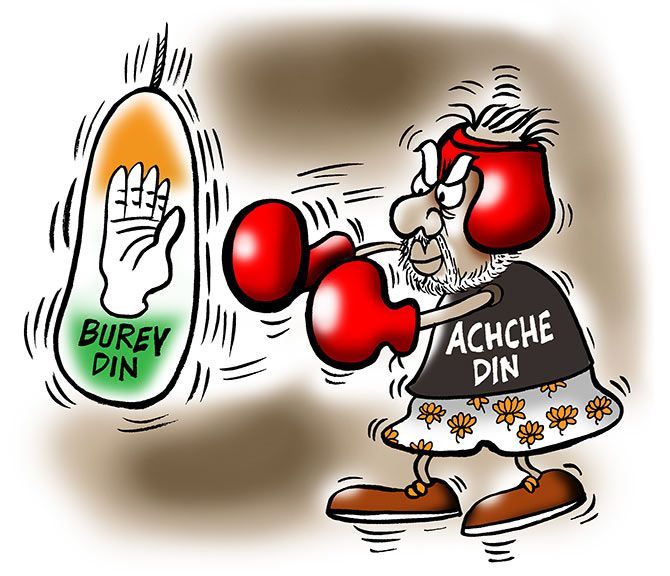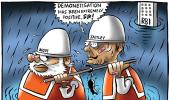'It is clear that economic policy and reform under this administration will always be afterthoughts, something to be carried out only when no other political concern intervenes,' argues Mihir S Sharma.
Illustration: Uttam Ghosh/Rediff.com

One of the biggest myths of the past few years has been the notion that the Bharatiya Janata Party wins elections on the basis of 'aspirations', of its promises of 'development', and because of Prime Minister Narendra D Modi's reputation as an economic manager.
In fact, the party's consistent electoral success over the past few years has been the product of having far more money, being far better organised, and playing far better caste politics than the Opposition.
This myth has been thoroughly exploded in the Gujarat assembly election. This is an election that was the BJP's to lose.
Nobody gave the Congress -- unprepared, inefficient, underfinanced, and with a broadly unpopular leader -- much of a chance.
For good reason; after all, Modi is Gujarat's favourite son.
And, let's be clear, I still thought the Congress will not just lose on December 18, but will lose badly. But that's not the point: The point is to examine how the BJP behaves when it fears it may just have its back against the wall.
At the moment of crisis, 'development' goes out the window, 'aspiration' is dumped, praises of Modi the economic manager are reserved for appreciative well-heeled audiences at New Delhi's many winter 'summits'.
Instead, we are treated to a master-class in religious polarisation and caste politics.
Is Rahul Gandhi a Hindu?
Does Hardik Patel represent all Patidars, or can some be sliced off from his coalition?
If the Congress comes into power, will it not -- horrors! -- appoint a Muslim chief minister?
Isn't Mani Shankar Aiyar insulting OBCs?
Pause and think: This is the election campaign that India's ruling party ran in a state that is its greatest stronghold. There was little that is forward-looking about it.
In fact, the party didn't even have a real manifesto out there.
No programme of further state-level reforms, of changes to Gujarat's broken health care or education, of improvements to the regulation of small business.
The BJP didn't even feel that is necessary. Should we really believe now that this is the party of 'vikas'?
It might be in the interest of those well-heeled New Delhi audiences to clap for generic, unspecific statements in praise of development, but not even they should take them as serious statements of political intent at this point.
We have been in the grip of a national delusion since about 2012: That Modi's sudden rise in popularity reflected the hope for sound economic management.
In fact, as many of us pointed out at the time, if you listened to what Modi fans were actually saying online and in person, that was not the basis of his or his party's appeal at all.
What Modi's most vocal fans did in fact respond to were the grievances that Modi articulated so well against an 'elite' that had ruled 'for 70 years', depriving real Indians of their due.
They responded to the promise of an India rendered glorious on the world stage.
They cheered the end of a millennium of 'slavery' to 'outsiders'.
In this, India anticipated the populist, nativist upsurge that has taken over world politics in the years since 2014.
Given this political imperative, it is clear that economic policy and reform under this administration will always be afterthoughts, something to be carried out only when no other political concern intervenes -- when, in other words, the government feels safe and comfortable enough to take a moderate risk.
Only those policy changes that can be fit into this counter-'elite' populist narrative -- demonetisation, for example, or the 'anti-promoter' implementation of the bankruptcy code -- will actually be prioritised.
Nor is this likely to change even after 2019, as the more deluded of observers -- including that endless fount of deliberately deceptive content-free blather, 'investor advisory reports' -- have started bleating of late.
Even when Modi is returned to power in 2019, as is overwhelmingly likely, nothing will change about the basic political incentives he and the BJP face.
Perhaps the prime minister himself would like to be seen by global audiences as a great reformer; but that will always come a poor second to consolidating power so the larger project of renewal or re-founding of the Republic of India can be carried out.
What does this augur for the months leading up to the 2019 general election? Frankly, I think we should all hope on some level, regardless of our political opinions, that the BJP does not feel politically threatened in those months.
The implications for public safety of such a campaign on a nationwide scale are horrific. Especially now that the BJP is in government and has its tame 'news' television channels to amplify and intensify such divisive messages.
Let's hope instead that they feel confident enough to stick to generic tributes to 'vikas'.












 © 2025
© 2025